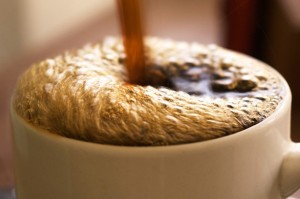More Buzz For Your Buck: Maximizing Your Caffeine Intake
While up to our ears in physics homework last week, my roommate and I had a chat or two about caffeine. And I wondered (as I poured a cup of coffee), is there a way to brew this stuff to maximize the caffeine I end up drinking? After Wednesday, exam day, a day that included a shameful amount of caffeine, I became curious as to its nutritional or even neurological value…or perhaps just hopeful that it had some. Maybe this isn’t neuroscience news per say, but it’s certainly a curiosity, and certainly relevant to my success in “Elementary Physics I”.
I was sure I wasn’t alone in my caffeine-chemistry quest and figured there must be sufficient research published to generate some answers. As it turns out, in 1996, Leonard Bell et al. at Auburn University conducted a study with the aim of improving epidemiological analyses of caffeine intake by allowing researchers to control for the effect of brewing methods on caffeine content. It’s an interesting read, perhaps in part because the “Materials and Methods” section starts out with buying coffee beans at a local grocery store and proceeds to (very methodically) describe various ways of making coffee.
The results of this experimentation with Eight O’Clock coffee helped satisfy my curiosity. Evidently, for those of us at home with no control over the flow rate of the water in our coffee machines, making larger volumes of coffee increases the time that the coffee grounds spend touching the hot water, allowing for a more complete extraction of the caffeine (a process best carried out between 195-205°F).
Although the researchers didn’t find a difference between the caffeine content of store-ground vs. home-ground (or lab-ground, I suppose) coffee, i.e. the length of time between grinding and brewing the beans, their evidence did indicate an effect of the size of the coffee grounds used. They analyzed the caffeine content of coffee made with fine, medium, and coarse grounds and found that finely ground coffee contained significantly more caffeine than the remaining two groups, and coarse grounds contained significantly less. The authors suggest that the larger surface area of fine-ground coffee is what makes it more conducive to caffeine extraction.
Finely ground coffee, and larger volumes of it…I think I’m going to need a bigger coffee pot. But is it worth my investment? What is the effect of this coffee consumption having in the long run?
The coffee-machine upgrade might be a good idea. A paper published last month in Movement Disorders correlated a reduced risk of Parkinson’s Disease (PD) with caffeine intake – significantly in men, and marginally in women. The current thought is that caffeine acts as an adenosine receptor (A2A) antagonist in the brain. Other studies have demonstrated positive effects of A2A antagonism with respect to PD – namely that A2A antagonists seem to protect dopaminergic neurons from destruction in several research models of PD. Additionally, caffeine’s capacity to treat Parkinsonian symptoms by acting as a psychomotor stimulant may a result of this mechanism.
So: question answered, lesson learned – brewing lots of finely ground coffee may not only improve my studying stamina, it might be keeping my brain healthy – and it’s delicious. Next time, for the sake of my GPA, let’s hope my curiosity leads me closer to the physics of my coffee addiction. Cheers!
References:
Caffeine content of coffee as influenced by grinding and brewing techniques – Food Research International
Coffee and Caffeine, Which Brewing Method Has the Most? – WeeklyRoast.com
Caffeine and Risk of Parkinson’s Disease in a Large Cohort of Men and Women – Movement Disorders


October 14, 2012
Hey you need to be more aware that caffeine causes/exacerbates anxiety and other mental health conditions.
Just read the 170+ pages of comments of people trying to get off caffeine here; http://coffeefaq.com/site/node/11
And the research referenced here; http://caffeineevaluation.blogspot.co.uk/
Many people feel they cannot ‘get going’ in the morning without caffeine; in reality they are just experiencing withdrawal from not having ingested any over the previous hours.
A key point is the research showing anxiety sufferers can be very sensitive to caffeine; some people think ‘it can’t be the caffeine, I only have 1 cup a day’, but for them that could be the key issue in their anxiety.
Withdrawal is not easy (especially first 2 weeks, when anxiety actually goes up), but is possible.
How about cutting all caffeine for 30 days and seeing how you feel?
October 23, 2012
withdrawal effects 2 weeks after stopping a 1-coffee-per-day routine? wat?